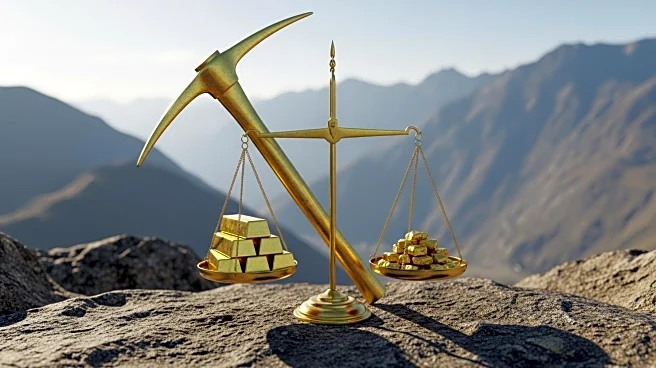What is the story about?
What's Happening?
Peru is considering significant reforms to its mining concession system, which could alter the landscape for both large-scale and small-scale mining operations. The proposed changes include reducing the duration of exploration rights from decades to potentially as little as 10 years, implementing 'use-it-or-lose-it' provisions to revoke idle concessions, and formalizing small-scale mining operations. These reforms are driven by the need to address illegal mining activities, which are estimated to result in $12 billion in illegal gold exports by 2025, and to reduce delays in major copper projects due to illegal mining invasions. The debate is fueled by the tension between large mining companies, which require long-term security for their investments, and small-scale operators seeking more immediate economic benefits.
Why It's Important?
The proposed reforms could have significant implications for Peru's economy, which heavily relies on mining, contributing approximately 10% of GDP and over 60% of exports. Large mining companies, such as BHP and Glencore, express concerns that shortened concession periods and increased regulatory burdens could deter investment, potentially redirecting billions to other countries. On the other hand, small-scale miners and local communities could benefit from increased access to resources and formalization opportunities. The outcome of these reforms could influence Peru's attractiveness as a mining investment destination and impact global supply chains, particularly for copper, a critical mineral for energy transition technologies.
What's Next?
The Peruvian Congress is currently debating the proposed reforms, with no consensus reached yet. The government has taken a cautious approach, with President Dina Boluarte mentioning potential changes but providing no specifics. The ongoing discussions are likely to continue through the upcoming presidential and legislative elections, where mining reform is expected to be a major issue. The outcome will depend on various factors, including congressional dynamics, industry lobbying, and international pressure from investors concerned about supply chain impacts.
Beyond the Headlines
The reform debate also highlights broader social and environmental issues. Local communities demand greater benefits from mining activities, and there are concerns about the environmental impact of both legal and illegal mining operations. The reforms could potentially address these issues by creating pathways for small-scale miners to operate legally and ensuring that large-scale operations adhere to strict environmental standards. However, achieving a balance between economic, social, and environmental interests remains a complex challenge.

















